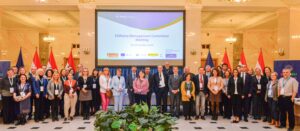
Representatives of EURoma partner authorities, European Commission and other relevant stakeholders also had the opportunity to exchange on other relevant aspects related to the use of EU Funds to promote Roma equality and inclusion, including relevant policy and financial developments, the consideration of Roma children in the implementation of the Child Guarantee, the alignment between the policy and the financial frameworks and the EU Cohesion Policy beyond 2027.
The EURoma Network held its second 2024 Management Committee meeting in Budapest on 24-25 October, hosted by Hungarian partners. The meeting brought together representatives of EURoma Network partner authorities (in particular National Roma Contact Points and public authorities in charge of ESF+ and ERDF) from 12 EU Member States, as well as representatives of the European Commission Directorate-Generals in charge of Roma equality and inclusion and EU Funds, and of the European Competence Centre for Social Innovation, which supports some of the Network’s activities. Other Hungarian stakeholders were also invited to attend part of the meeting.
The meeting paid particular attention to analysing how territorial approaches can be inclusive of Roma and other disadvantaged groups, based on partners’ experiences. Other issues relevant to the use of ESF+ and ERDF for Roma equality and inclusion were also addressed, such as policy and financial developments, the inclusion of Roma children in the implementation of the Child Guarantee, the alignment of policy and financial frameworks, and the Cohesion Policy beyond 2027. The upcoming activities of the EURoma Network were also reviewed.
Participants also had the opportunity to gain a better insight into the Hungarian context, including the situation of Roma, the existing policy and financial framework related to Roma equality and inclusion, as well as specific experiences, in particular those related to the use of a territorial approach.
Hungarian context as regards Roma equality and inclusion
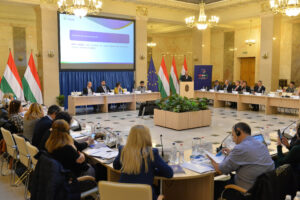 Representatives from Hungarian EURoma partner authorities as well as from other relevant actors shared with participants information on the situation of Roma in the country and on how Roma equality and inclusion are considered, both within the policy framework and as regards the use of ESF+ and ERDF.
Representatives from Hungarian EURoma partner authorities as well as from other relevant actors shared with participants information on the situation of Roma in the country and on how Roma equality and inclusion are considered, both within the policy framework and as regards the use of ESF+ and ERDF.
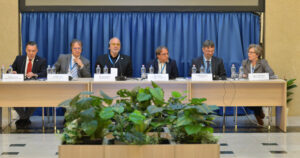 Particular attention was paid to the use of a territorial approach in the country. Firstly, Hungarian representatives presented the general framework for territorial planning as well some of the instruments used for its development, including the local equal opportunities programmes, the existing national information system and the system of social urban rehabilitation programmes within the Territorial and Settlement Development Operational Programme Plus. Then a number of experiences were presented, including the Emerging Settlement Programme, the project of social urban rehabilitation in Sikós Town and a project related to the health monitoring of segregated areas.
Particular attention was paid to the use of a territorial approach in the country. Firstly, Hungarian representatives presented the general framework for territorial planning as well some of the instruments used for its development, including the local equal opportunities programmes, the existing national information system and the system of social urban rehabilitation programmes within the Territorial and Settlement Development Operational Programme Plus. Then a number of experiences were presented, including the Emerging Settlement Programme, the project of social urban rehabilitation in Sikós Town and a project related to the health monitoring of segregated areas.
Inclusive territorial approach in EU Member States
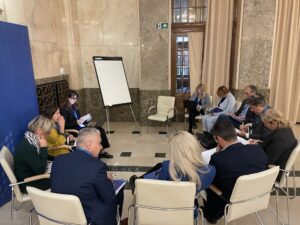 Participants then focused on the use of a territorial approach/planning at European level and what could be key elements to consider to esnsure that interventions implemented with a territorial approach (e.g. through local or regional development plans…) take into account Roma and other disadvantaged groups.
Participants then focused on the use of a territorial approach/planning at European level and what could be key elements to consider to esnsure that interventions implemented with a territorial approach (e.g. through local or regional development plans…) take into account Roma and other disadvantaged groups.
Relevant elements of the general framework for action were presented, including the Council Conclusions that the Hungarian Presidency is working on, as well as the potential contribution of ESF+ and ERDF. This was followed by a review of existing practices in EU Member States, based on an analysis carried out by the Hefta Research Institute as a contribution to the Presidency’s Council Conclusions, as well as on the presentations of some partner countries. Building upon these presentations and the experiences in their countries, partners exchanged views on how to ensure that the territorial approach is inclusive of Roma and what are the critical elements to ensure this.
EU policy and legal developments as regards Roma equality and inclusion
Relevant EU policy and legal developments in relation to Roma equality and inclusion and European Cohesion Policy funds were reviewed. This included the recently published European Commission report on the implementation of the National Roma Strategic Frameworks (NRSFs), the recent European Platform for Roma Inclusion and a reflection on how the Roma issue could be framed in the new European Commission.
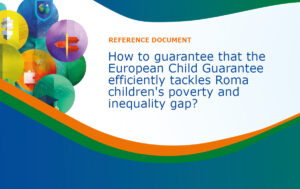 The consideration of Roma children in the implementation of the Child Guarantee was also discussed, based on the analysis that EURoma, together with Eurochild, is carrying out on the biennial implementation reports on the Child Guarantee that EURoma partner countries are currently submitting to the European Commission. The Reference document on the Child Guarantee published by EURoma at the launch of the Child Guarantee has already identified critical aspects that need to be taken into account in the context of the Child Guarantee National Action Plans and the 2021-2027 programming period of the European Cohesion Policy Funds 2021-2027 (in particular ESF+ and ERDF), in order to ensure that they contribute to effectively addressing the poverty and inequality gap currently faced by Roma children.
The consideration of Roma children in the implementation of the Child Guarantee was also discussed, based on the analysis that EURoma, together with Eurochild, is carrying out on the biennial implementation reports on the Child Guarantee that EURoma partner countries are currently submitting to the European Commission. The Reference document on the Child Guarantee published by EURoma at the launch of the Child Guarantee has already identified critical aspects that need to be taken into account in the context of the Child Guarantee National Action Plans and the 2021-2027 programming period of the European Cohesion Policy Funds 2021-2027 (in particular ESF+ and ERDF), in order to ensure that they contribute to effectively addressing the poverty and inequality gap currently faced by Roma children.
Alignment between NRSFs and EU Funds
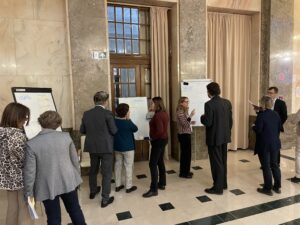 Partners exchanged views on one of the key issues for promoting increased and effective use of European Cohesion Policy funds in 2021-2027: the alignment between the policy and financial frameworks, in particular the National Roma Strategic Frameworks (NRSFs) and ESF+ and ERDF. They shared information about the mechanisms and tools used in their countries, reflecting on the progress made over the past years andt the positive elements contributing to this alignment as well as on the areas for further progress…
Partners exchanged views on one of the key issues for promoting increased and effective use of European Cohesion Policy funds in 2021-2027: the alignment between the policy and financial frameworks, in particular the National Roma Strategic Frameworks (NRSFs) and ESF+ and ERDF. They shared information about the mechanisms and tools used in their countries, reflecting on the progress made over the past years andt the positive elements contributing to this alignment as well as on the areas for further progress…
Roma equality and inclusion in post-2027 Cohesion Policy
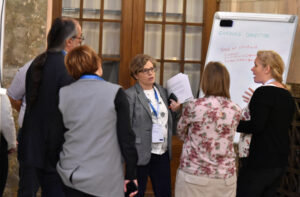 Partners also reviewed the state-of-play of the discussions on the future of Cohesion Policy and the scope for action for the EURoma Network and its partners. Based on the experience of this programming period, partners reflected on the key elements that need to be taken into account to ensure that Roma equality and inclusion is effectively mainstreamed in Cohesion Policy beyond 2027.
Partners also reviewed the state-of-play of the discussions on the future of Cohesion Policy and the scope for action for the EURoma Network and its partners. Based on the experience of this programming period, partners reflected on the key elements that need to be taken into account to ensure that Roma equality and inclusion is effectively mainstreamed in Cohesion Policy beyond 2027.
EURoma work plan and next activities
Partners also had the opportunity to review the upcoming activities of the EURoma Network.

